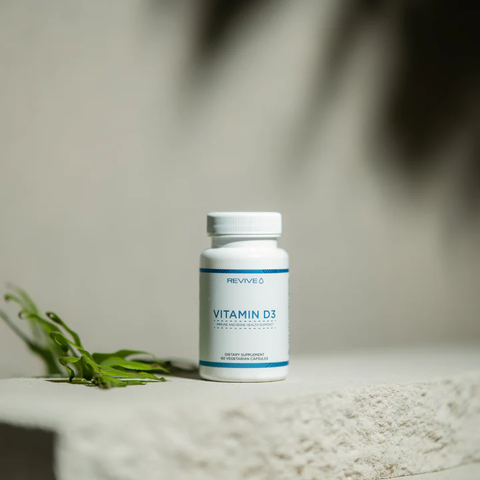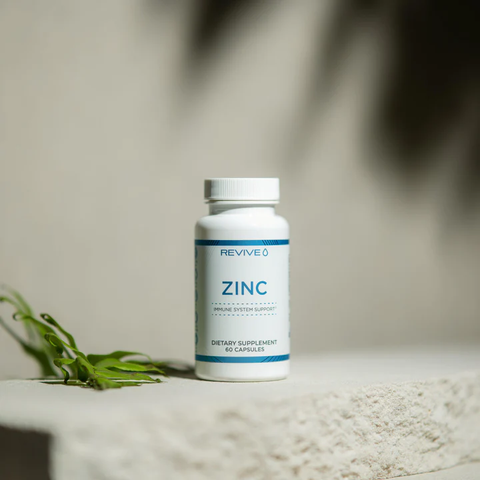Why You Get Sick When the Seasons Change
Have you ever wondered why you get sick when the seasons change? While most colds hit hardest during the fall and winter, there's another peak of colds that happens in the spring. Experts say there are a few reasons for this. In both spring and fall, allergies can make people more prone to getting sick.
Allergies cause swelling in your nose, which makes it easier for viruses to take hold. Plus, when your body is busy fighting allergies, it doesn't have as much energy to fight off other illnesses. Even if you don't have allergies, the big changes in weather during spring and fall can irritate your airways and weaken your immune system, making you more susceptible to colds and infections.
In this article, we’ll be answering the question: “Why do I get sick when the seasons change?” This is a surprisingly common question, but we’ve done our research and are here to get to the bottom of this topic, so stick around!

Reasons for Sickness During Season Change
Surprisingly, it’s not the weather itself that makes you sick — it’s viruses that are to blame. These viruses tend to multiply rapidly when the seasons change, leading to more people falling ill with common cold symptoms in the winter and/, or experiencing similar symptoms (like seasonal fever) in the summer.
When the seasons change, our bodies undergo several changes. These changes can make us more susceptible to viruses. Our bodies function the most efficiently at certain temperatures. When the seasons change, our bodies have to readjust to new conditions. This adjustment period can weaken our immune systems, and leave us more vulnerable to catching colds and other illnesses.
In the winter months, the risk of catching the flu is particularly high. This is because the influenza virus thrives in colder temperatures. When the air is cold, the influenza virus can spread like crazy, increasing the likelihood of people becoming infected. As a result, winter is a peak time for flu outbreaks and sickness related to the flu virus. Let’s break down these reasons for sickness during season change in more detail below:
Weather changes
Colder temperatures make us more prone to illness. Common flu viruses, like the human rhinovirus and influenza, spread more easily in cold and dry air. The dry air can dry out the mucus membranes in our nose and mouth, which normally act as barriers against viruses.
When these membranes are dry, viruses find it easier to enter our bodies. Needless to say, this increases the risk of seasonal flu. Breathing in cold air can also cause blood vessels to narrow, making it harder for white blood cells to reach the mucous membrane and fight off viruses effectively.
Reduced immune function
During fall and winter, people tend to spend more time indoors to escape the cold. However, staying indoors can weaken our immune systems. Vitamin D, which is essential for boosting your immune health, is produced when our skin is exposed to sunlight.
Spending less time outdoors means less exposure to sunlight and a potential deficiency in vitamin D. This leaves us more vulnerable to infections, and is the reason why many people choose to take vitamin D supplements in fall and winter.

Increased exposure
Cold weather often means more time spent indoors, where viruses can spread more easily. Close contact with others in indoor environments makes it a whole lot easier for viruses to circulate.
It’s all too easy to breathe in air that contains viruses or to accidentally touch our faces after touching a contaminated surface. These simple things can lead to infection, as can poor indoor air quality due to inadequate ventilation and dry air from heating systems.
Allergies
If you're constantly sniffling and sneezing when the seasons change, you may be dealing with allergies instead of a cold. Allergies occur when your body mistakenly identifies harmless substances — such as pollen from ragweed — as threats to your health.
Sneezing, a runny nose, and watery eyes are common reactions your body has to these allergens. As mentioned previously, allergy symptoms often get worse during the fall or spring when there's an increase in pollen and mold spores circulating in the air.
Ways to Prevent Getting Sick as the Seasons Change
As you can see, there are many reasons why we tend to get sick when the seasons change. While it’s almost impossible to avoid getting at least one cold a year, there are a few things you can do to stay healthy, even during that precarious time when the seasons are changing. Let’s take a closer look at these ways to avoid sickness as the seasons change below:
Wash your hands
You’ve heard this a million times before, but that’s only because it’s really good advice. Your hands can pick up lots of bacteria from the various surfaces you touch throughout the day. When you touch your mouth, eyes, or ears with these germ-covered hands, it's easy for viruses to enter your body.
Being mindful of washing your hands regularly, particularly before eating, is one of the most effective ways to avoid getting sick as the seasons change. If you're not close to a sink, using hand sanitizer is your next best bet for keeping your hands clean and reducing the risk of illness.
Get vaccinated
This isn’t a political statement — it’s just good advice. Getting vaccinated for the flu not only lowers your risk of catching the flu yourself, but it also helps protect others around you. The flu mostly spreads when someone who's already sick comes into contact with others. So, when more people are vaccinated, there's less chance of the virus spreading from person to person.
Stay in shape
During the fall and winter, all you want to do is curl up under a blanket with some hot chocolate and a good book. It’s super important to keep getting regular exercise during this time, though! Getting regular exercise might just lower your chances of getting sick.
The research found that people who regularly did mild exercise, like 45 minutes of activity 3-5 days a week, had stronger immune systems against upper respiratory illnesses. Another study revealed that simply walking for 35-45 minutes, 5 days a week, led to half as many sick days being used compared to those who were less active.
Gargle water
A study found that people who regularly gargled plain water were less likely to get an upper respiratory infection compared to those who didn't. It may sound unexpected, but this simple act could help flush out any bacteria lingering in your mouth and throat. Tap water is suggested because the chlorine in it can help fend off germs. The recommendation is to swish tap water around your mouth for about 60 seconds and then spit it out.
Get enough sleep
In the summer, many of us prioritize enjoying longer evenings outdoors over getting a good night's sleep. When temperatures cool down and the days get shorter, though, it’s important to maintain a consistent sleep schedule to stay healthy. Your sleep patterns and how long you sleep directly impact both your mental and physical health.
A study found that people who slept less than 7 hours per night were up to three times more likely to catch a cold compared to those who slept for more than 7 hours. This is why it’s so important to establish a regular sleep schedule and stick to it!
Supplements You Can Take to Prevent Getting Sick
When it comes to preventing illness due to the seasons changing, one of the best things you can do is take supplements. Listed below are the most effective vitamins and supplements you can take if you’re trying to avoid getting sick:
Zinc
This mineral supports immune system function and metabolism. It's also important for wound healing, as well as taste and smell sensations. We have zinc supplements available on our website, so don’t hesitate to check it out!

Vitamin D
Vitamin D is particularly important for those with deficiencies. As previously mentioned, it boosts the immune system’s ability to fight infections. Besides supplements, the best sources of Vitamin D include oily fish, eggs, fortified cereals, milk, mushrooms, and sunlight.
Vitamin C
As an antioxidant, Vitamin C fights free radicals, reduces oxidative stress, and boosts immunity. It also helps with iron absorption and promotes faster recovery from illness. Foods that are high in Vitamin C include bell peppers, kale, guava, broccoli, strawberries, mangoes, oranges, and lemons.

Vitamin E
When the seasons change, your skin can become dry and flaky — which is never fun. This is especially true if you have eczema or psoriasis. Vitamin E supports skin health by promoting tissue buildup. Sources of Vitamin E include meat, fish, spinach, broccoli, red bell peppers, pumpkin, almonds, peanuts, and sunflower seeds.
B Vitamins
B vitamins are super important for a healthy body. They impact energy levels, brain function, and cellular metabolism. The vitamin B complex consists of eight different vitamins. Vitamin B12, for example, helps combat lethargy in winter, since it promotes cell functioning. Foods that are rich in B vitamins include eggs, leafy greens, fish, liver, poultry, dairy, legumes, oranges, and whole grains.
Magnesium
Magnesium is more important than you might think. It plays a significant role in nerve and muscle function, blood pressure regulation, and immune support. It can be difficult to get enough magnesium naturally, so it’s a good idea to take supplements (after consulting with a health professional first, of course).
Eleutherococcus Senticosus (Siberian Ginseng)
This adaptogenic herb is known for enhancing energy levels and increasing resilience to stress. It helps to support the immune system and improves physical and mental performance, making it ideal during the seasonal transitions.
Rosehips
Rosehips are rich in Vitamin C and antioxidants, which help strengthen the immune system and combat inflammation. Their high vitamin content can aid in boosting overall immunity and improving skin health during colder months.
Dietary Fiber (Inulin & Chia Seed Powder)
Both inulin and chia seed powder provide excellent sources of dietary fiber that support digestive health and regulate immune system function. They help maintain gut health, which plays a critical role in immunity.
Spirulina
Spirulina is a nutrient-dense algae known for its immune-boosting properties. It's packed with antioxidants, B vitamins, and essential amino acids, helping to strengthen the immune system and support overall health during seasonal changes.
Thyme Extract
Thyme extract is renowned for its antimicrobial and anti-inflammatory properties. It has been used traditionally to fight off respiratory infections and boost immunity, especially useful during cold and flu season.
Oregano Extract
Oregano extract is rich in antioxidants and has antiviral, antibacterial, and antifungal properties. It's often used to support the respiratory system and strengthen the immune response, making it a great addition to your health regimen.
Quercetin
Quercetin is a powerful antioxidant that supports immune function by reducing inflammation and oxidative stress. It also helps protect against seasonal allergies, making it a useful supplement to take during the transition to warmer weather.
Stay Healthy All Year Round With Revive’s Supplements
Keep in mind that you can follow all of the tips discussed in this article and still get sick. Illness is just a part of life, and sometimes, it’s unavoidable. Still, if you wash your hands, get enough sleep, and take supplements, you’ll be a lot less likely to get sick when the seasons change.
From zinc supplements to vitamin C supplements, Revive MD has everything you could need when it comes to illness prevention. Check out what we have to offer, and never miss out on a social gathering or important work meeting due to illness again!
The information being presented in this blog is intended to be used as educational or resource information only. It is not intended to be a substitute for medical advice from your healthcare provider. This content should not be used for the diagnosis or treatment of any medical condition. If you have any questions or concerns about your health, please contact your healthcare provider. You should call 911 for all medical emergencies. Revive MD is not liable for any advice or information provided on this blog, which advice or information is provided on an “as-is” basis, and assumes no liability for diagnosis, treatment, decisions, or actions made in reliance upon any advice or information contained on this blog. No warranties, express or implied, are made on the information that is provided.





 Liver & Detox Support
Liver & Detox Support
 Gut & Digestive Health
Gut & Digestive Health
 Hormones, Stress & Metabolism
Hormones, Stress & Metabolism
 Sleep & Relaxation
Sleep & Relaxation
 Heart, Brain & Immune Health
Heart, Brain & Immune Health
